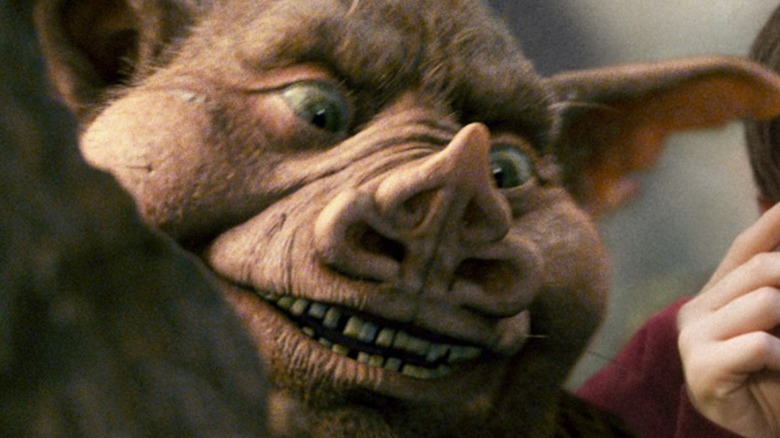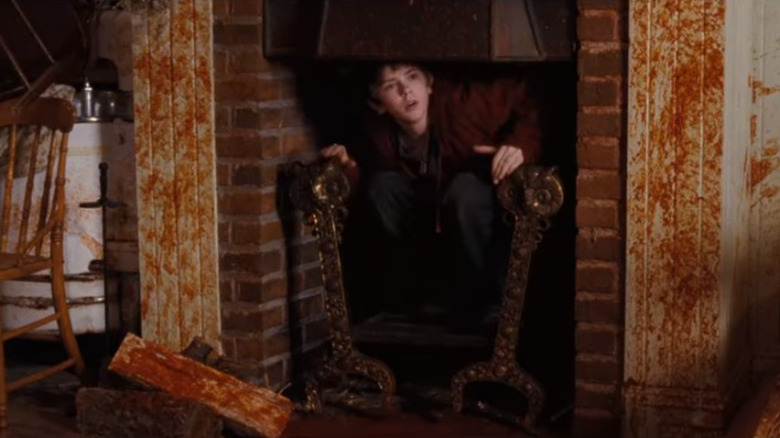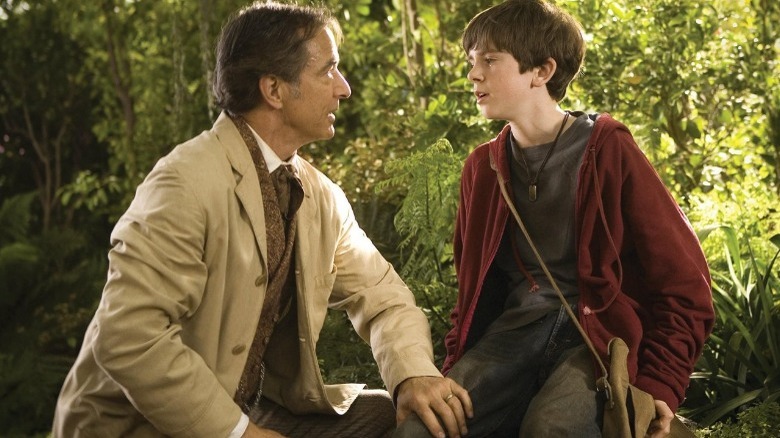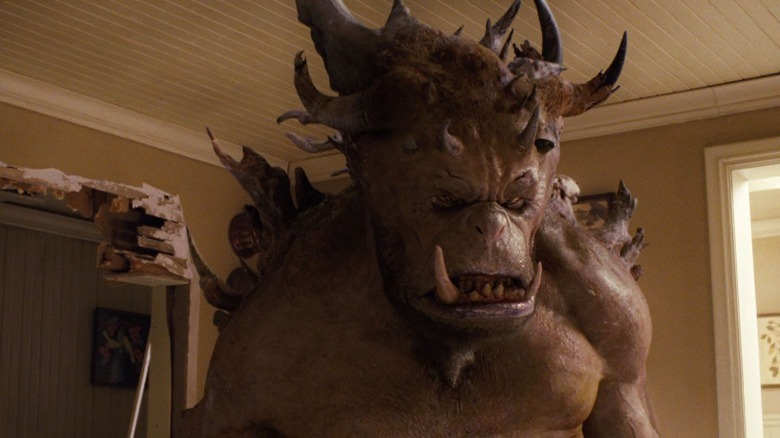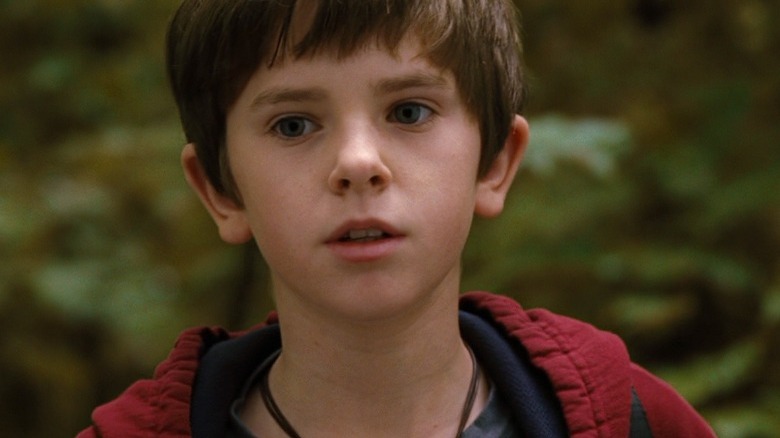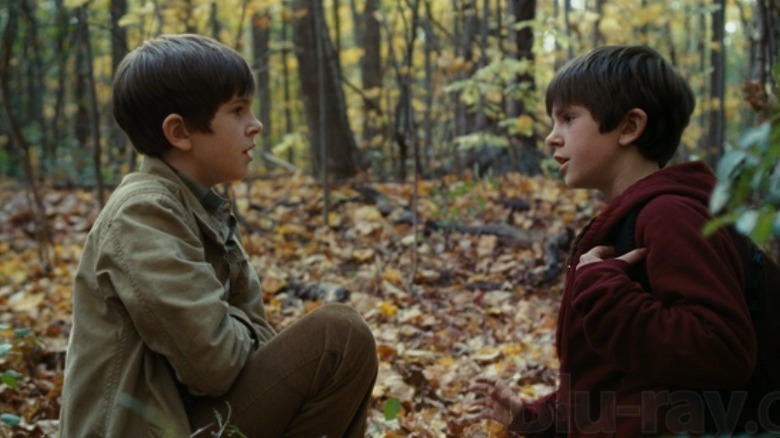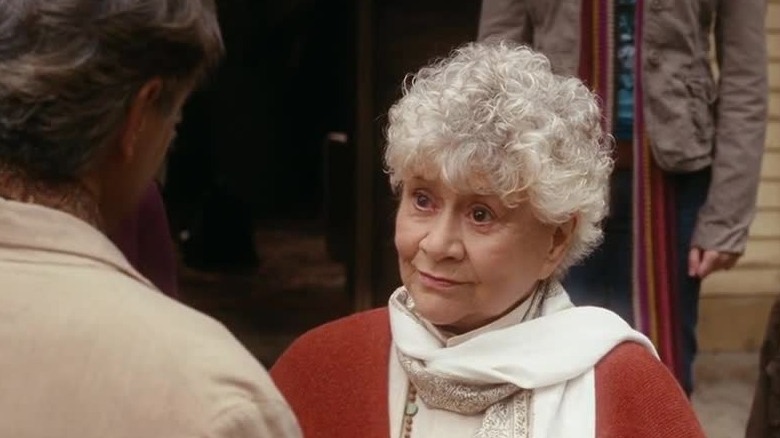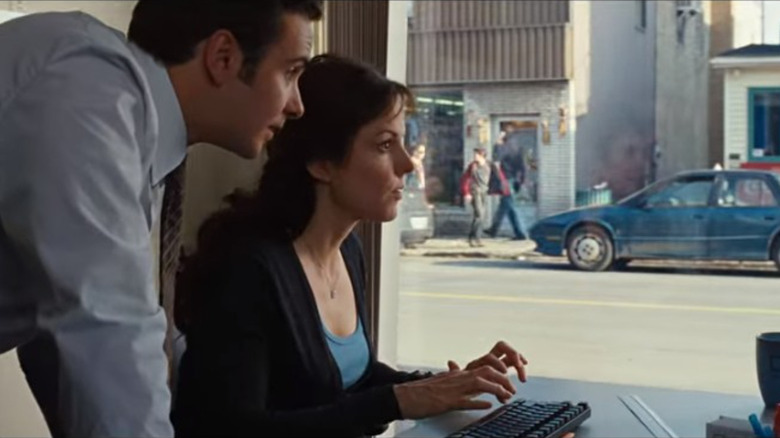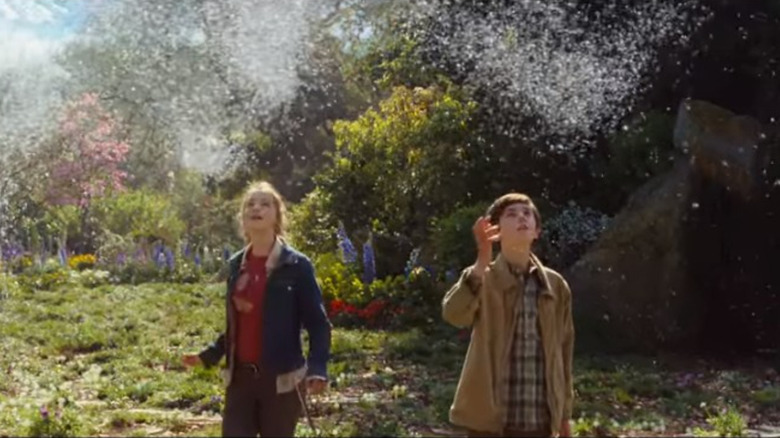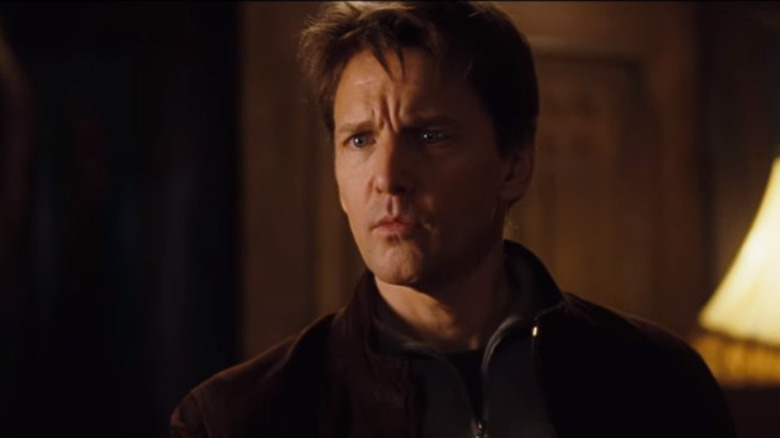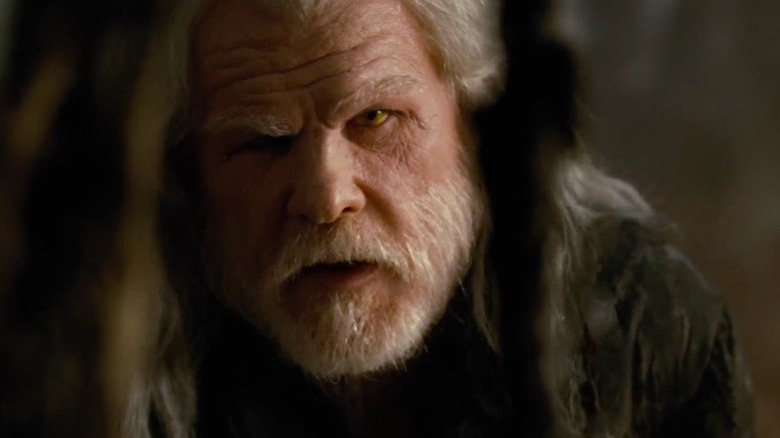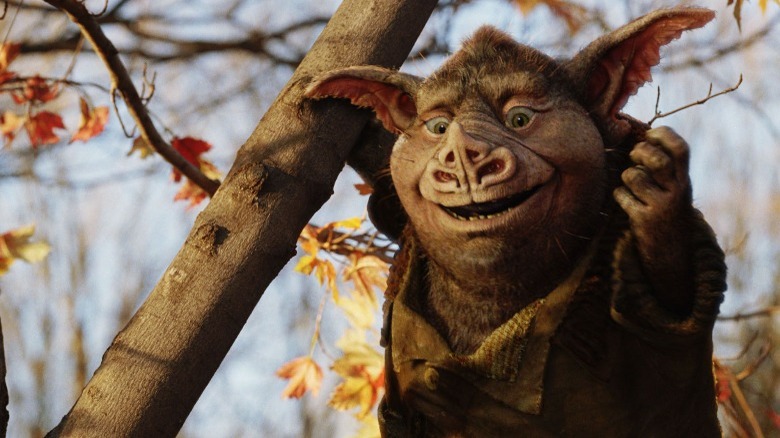Things In The Spiderwick Chronicles Only Adults Notice
If you were the right age in 2008, you perhaps let out a nostalgic "oh yeah!" when recent headlines announced that Disney+ is adapting "The Spiderwick Chronicles" books into a TV series. One of the many, many children's fantasy series that were popular in the decade after the "Harry Potter" franchise set the publishing world on fire, the fifth and final volume of "The Spiderwick Chronicles" had an initial print run of 250,000 copies in 2004. All five books were adapted into one movie in 2008.
The movie was well-received and avoided a lot of the clunky kid-actor stiffness of the first two "Harry Potter" movies, largely thanks to star Freddie Highmore in a dual role as twins Jared and Simon Grace. But in burning through the entire first series of the books in one film, it didn't spawn any sequels, and its impact faded after its modest $164 million box office return on a $90 million budget. While you may have idly wondered what the cast is up to, it's likely you haven't revisited "The Spiderwick Chronicles" movie since watching it as a kid. Watching it again (it's currently streaming on Netflix), it holds up as a rollicking family-friendly adventure while also sparking several new observations and questions. These are the things you notice about "The Spiderwick Chronicles" as an adult.
The movie is way more violent than it had to be
From this vantage point in history, it's clear that "The Spiderwick Chronicles" was a peculiar product of its time. The books, by authors Tony DiTerlizzi and Holly Black, are aimed at ages 9-12 and definitely in the vein of J.R.R. Tolkien's classic "The Hobbit," which balanced occasional glimpses of war with a low key fairytale atmosphere. Indeed, the books have main character Jared notably tricking a troll in a direct homage to the easily fooled trolls in "The Hobbit."
Much like the movie trilogy that bloated and extended Tolkien's languid children's fable into three grim CGI-fests, "The Spiderwick Chronicles" condenses the five books of its source material and loses a lot of whimsy and fairy lore for escalating fights. At first, Jared, his brother Simon, and sister Mallory just get nasty-looking cuts from the goblins pursuing them. But eventually, the movie makes up its own climax where they're using tomato sauce to full-on explode goblins en masse, and the red sauce all over the walls looks unsettlingly like a bloodbath.
Finally, the movie has an entirely invented scene where Jared stabs his father in the stomach. Of course, he's realized that it's actually the ogre Mulgarath in disguise, but it's a nonetheless surprisingly violent, very "Lord of the Rings" moment in what was originally more kid-friendly, "Hobbit"-like source material. Despite the proven success of kid's books, between the "LotR" movies and the increasingly darker "Harry Potter" movies of the late 2000s, it's clear the producers of "The Spiderwick Chronicles" were convinced audiences wanted some gore to go with their fantasy.
The themes are incoherent
"The Spiderwick Chronicles" tells two basic stories: Jared is upset that his parents are separating and he has to move away from New York and into the Spiderwick estate, and he discovers Arthur Spiderwick's field guide to fairy creatures and has to keep it safe from evil forces. Revisiting the movie now, the family stuff is pretty standard and boils down to the eternal lesson of, "Hey, give your mom a break, she's trying her best."
But when you think about it, it's unclear what the spiritual takeaway of all of the fairy stuff is supposed to be. A vast majority of children's adventure stories like this can be summed up as "there's magic in the world, you just have to know where to look." But looking for the magic in the world in "The Spiderwick Chronicles" is actually the source of nothing but familial tragedy and great danger. The very existence of Arthur's field guide is presented as a threat to fairy creatures and humanity at large since Mulgarath is trying to use it to take over the world, and even just knowing what's in the book is a liability. Arthur is held hostage in the sylph realm of the fairies for 80 years, tragically separated from his daughter, who lives her life alone and is eventually committed to a mental hospital. So what's the message? "There's magic in the world, but for God's sake, kids, don't look for it! Do you want to get us all killed?"
How exactly would Mulgarath use the book?
For all his supposed world-ending badness, the mechanics of the threat that the main villain Mulgarath poses to the world are never fully explained. Hogsqueal, a dimwitted hobgoblin, helpfully explains that Mulgarath used a page from the book to somehow kill the rest of his family and claims that if the ogre gets ahold of the rest of it, it would be bad for humanity. But how? This is borne out only a little when he gets ahold of the page explaining how to break the protective mushroom ring around the Spiderwick house.
Setting aside why Arthur Spiderwick would leave instructions on how to break his own protective spell in his field guide, Mulgarath's motivation and plan are generally vastly underexplored parts of the film amid its hectic pace. There's some material in the books that make his grand scheme clearer — at one point, he uses wisdom from its pages to rapidly raise an army of dragons. But imposing as he is, Mulgarath in the film is a paper-thin bad guy with generic evil motivations, no coherent plan, and all-around kind of a waste of a well-cast Nick Nolte.
Jared is an insufferable brat
Jared Grace is a decent enough hero, as far as these stories go. He's quick on his feet, and eventually makes up with his mother and siblings despite starting the film as a pouty miscreant that's unhappy about moving. But one of the most annoying things about watching the film with adult eyes is how downright childish he manages to be in the midst of, you know, discovering that fairies and a heretofore unknown magical world exist. You can forgive his sour mood at the beginning of the film as you wait for him to learn the timeless movie lesson that the impending divorce wasn't all mom's fault.
But egregiously, two-thirds of the way through the action, after fighting off goblins and escaping certain death at the hands of a river troll, Jared takes a time out from the adventure with world-ending stakes to yell at his mother a little more. He goes all the way to "this is why dad left you!" and "I hate you!" when she quite reasonably expresses skepticism that all of these supernatural beings exist sight unseen. Based on how little time the movie gives the family plot overall, it comes mostly out of nowhere and just makes him annoying. Plus, he takes the field guide with him multiple times and puts the whole world in danger after expressly being told how important it is not to remove it from the house, and this after ignoring the warning note not to read it in the first place. Get it together, Jared.
How does Simon feel about his dad?
The closest thing Jared has to a character arc in "The Spiderwick Chronicles" involves his parents' separation. It's a familiar story where his mother Helen hasn't quite explained to him the reasons for the split — namely that his father has met someone else — so Jared unfairly blames her until he finds out the truth. His older sister Mallory knows the truth and attempts to play peacemaker and cut Helen some slack from time to time, but as the younger sibling, Jared is stuck in the interminable grey area between childish petulance and a more adult understanding of life.
It's all well and good, but somehow not factoring into this family dynamic are the feelings of Jared's identical twin brother, Simon. In a wonderful dual performance, Freddie Highmore gives Jared and Simon very distinct personalities — it's always clear who is who, and the effects and body double work are seamless. But at no point does anyone mention how Simon feels about the separation or his degree of knowledge about the reasons why. He's just kind of ... there. And while it seems to fit in with his quieter, more studious personality not to make a dramatic show of his feelings like Jared, it's particularly strange on a rewatch how much screen time is given to one twin's feelings about their new life situation and not his identical twin, who surely is going through a lot of the same turmoil.
Great aunt Lucinda's life is especially tragic
It bears repeating that "The Spiderwick Chronicles" is a PG-rated movie intended for children. Nevertheless, the tale of great aunt Lucinda Spiderwick, from whom the Grace family inherited the Spiderwick estate, is perhaps the darkest story you'll recall in a kids film of any kind. Just a child when her father is taken away by fairies to be trapped in the sylph realm, she's haunted by the memory of invisible goblins attacking her while she watches her father being carried off into the sky. She then spends some portion of her life attempting to protect the field guide and the house from dark forces, all alone, and is eventually put away in a mental ward because of deep scratches from a goblin bite on her arm.
Once again, this is a direct quote from a PG movie: "When they say suicide, and you say goblins, here [the psych ward] is where they send you." So Lucinda spends eight miserable decades not knowing what happened to her father and not living any other sort of life that we know of. You also have to think it's a little irritating when her great grand-nephews and niece immediately figure out how to reach her father in the sylph realm using only the field guide that she supposedly knows inside and out. Even Lucinda's happy ending, when she's reunited with her now much-younger-than-she-is father, Arthur, is hauntingly bittersweet after a wasted life at best.
What is Helen's job?
This is a very blink-and-you'll miss it moment, but having grown up and had jobs, you have to wonder: What on earth is Helen Grace's new job? When her children go to town to find Aunt Lucinda, she sees them out the window while she's training for her new position. We see her holding her fingers awkwardly over a keyboard like she's never seen one before, as a man that's presumably her new boss explains a series of simple keystrokes to her as if she's a child. Even in the monumentally less computerized time of 2008, it's hard to imagine what job you can get from out of town that pays enough to support three children and maintain a large, run-down estate that doesn't involve already knowing basic computer skills. It's never made clear what Helen did in New York City or what the upcoming alimony situation might be, but let's just hope she's a quick learner for her family's sake.
How does time work in the sylph realm?
When the Grace children go to the realm of the sylphs where Arthur Spiderwick is being held prisoner, he's surprised to learn that 80 years have passed back in the normal world. From his perspective, he left his daughter "just this morning." There's even a CGI-animated shot of the moon and sun rapidly passing by one another in the sky, announcing rather definitively that time flows very differently there.
How, then, has barely any time passed when the Grace children get back to the Spiderwick estate? If 80 years have passed in the roughly 12 hours that Arthur has been there, then about 40 days are passing every hour (or by another measure, about 16 hours every minute). So even a very brief visit to the sylph realm — if the flow of time is constant at all — should result in the Grace children returning to their mother desperate to find them after an absence of at least a day or two. The scene should have a time-warped urgency like the scene on the water plant in "Interstellar," but it seems the sylphs recognized that Jared and his siblings were in a hurry and made an exception.
How is Jared sure that he didn't stab his father?
In the climactic battle, the threads of the story all come together when Jared's father seemingly appears in the middle of the chaos. Jared asks him what he has come to tell him, expecting that his father will come clean about having met someone else and being the reason for the separation from his mother. When he instead meekly says, "I love you," Jared stabs him in the gut, revealing him to be Mulgarath in disguise.
"The Spiderwick Chronicles" seems to think this is a clever moment that makes Jared's underlying family drama serve the stakes of the big fight, but it's actually kind of confusing. Thus far in the story, it's only established that Mulgarath can take the form of an older man that looks like Nick Nolte. And since the entire dramatic stakes of Jared's relationship with his father are based on his father avoiding the truth of his destroyed marriage, it seems kind of reasonable to think his actual father might stall again if put on the spot. The point is, it seems pretty likely that Jared could be stabbing his real, human father in the stomach, and he just gets lucky that it turns out to be an ogre instead.
Is Mulgarath the only ogre?
When Mulgarath is vanquished at the end of the story, everyone's happy. The field guide isn't destroyed, but the evil ogre seeking to use its secrets to conquer the world is gone. But aren't there any others? The chief conflict of "The Spiderwick Chronicles" is that Arthur made the field guide — full of all the fairy realm's secrets — and it might fall into the wrong hands. The fairies go so far as to kidnap Arthur and hold him captive for 80 years just because his knowledge is a liability.
It seems hard to believe, then, that Mulgarath was the sole evil being that might use that knowledge for nefarious ends. After all, Mulgarath must have come from somewhere. Did he have family? Friends? Are there any goblins out there smart enough to read? Based on the logic of the story, you'd think the fairies would go ahead and destroy the book and then abduct the entire Grace family to the sylph realm just in case.
Hogsqueal is a bit of a deus ex machina
The hobgoblin Hogsqueal is one of the characters that retains the whimsy and silliness that the original book series offered. Despite his tragic backstory — namely that Mulgarath used the field guide to kill his entire family — he laughs, gets distracted trying to eat birds, and is charmingly voiced by a well-chosen Seth Rogen. This helps obscure the fact that he functions mostly as an intrusion of the story to keep the plot moving forward. First, he succinctly explains the stakes of the story to Jared, then helps him and his siblings see the fairy creatures by helpfully spitting in their eyes — a very convenient ability.
After helping the team, he's pretty much not seen again until he's conveniently in the perfect spot at the perfect time to eat Mulgarath when he changes into a bird to catch the airborne field guide after Jared throws it. Ostensibly, it's a pretty satisfying moment, as he has revenge for his family, and it ends the big showdown. But since Hogsqueal is basically a non-player character from an RPG game that shows up for exposition, it's not as satisfying as it could have been if his character had been more developed or his relationship with the Grace family more extensive.
